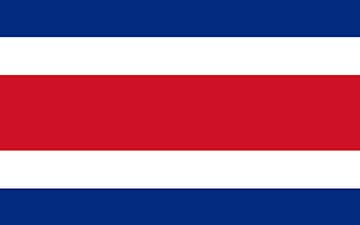Costa Rica
Knowledge Base
Frequently asked question, important data and information on EOR.

General information
$ 350975 CRC per month
Labor Law
Laws that regulate Labor Relationship
• Labor Code
• The Political Constitution of Costa Rica
• Income Tax Law
Onboarding guide
- Contract requirements
- Types of contracts
- Probation Period
- Offer letter
- Digital signature
- Onboarding documents
Requirements for a labor contract
• Name, nationality, age, gender, marital status, and address of the contracting parties
• Identity card number of the contracting parties
• Work in a place address
• Contract term
•Working hours
• The salary, whether it is to be calculated per unit of time, per unit of work, or some other, and the form, period
• Any other stipulations agreed upon by the parties
• The place and date of the execution of the contract
• The signatures of the contracting parties, it being understood that two witnesses may validly substitute the signatures of those who do not know how or are unable to sign
Pre-hire Medical exam
Not mandatory
Types of contracts
•Indefinite
•Fix term
•Per Job
Probation Period
The probation period in Costa Rica is dependent on the type of role and is stipulated within the employment agreement. In general, though, probation periods are three months.
Are offer letters mandatory in the country?
Not Mandatory
Are digital signatures in labor contracts valid?
Not Permitted
Mandatory onboarding documents
• ID Card
• Bank account
• Physical Identification number
Statutory benefits
Annual Bonus
It is mandatory. Companies pay a bonus equivalent to one month’s salary after the employee has worked for one year, or a proportional amount if the employee has worked for less than one year. Paid within the first 20 days of December.
Additional bonus
Doesn’t Apply
Leaves (medical, maternity, paternity, etc.)
• Sick leave: Employees in Costa Rica are entitled to full paid sick leave for the first three days of sickness. The employer pays 50.00% of the employee’s regular salary, and social security pays the remaining 50.00%. From the fourth day of sickness, social security pays 60.00% of the normal daily wage, and the employer is not obligated to pay anything to the employee. The employee must submit a medical certificate to the social security administration to receive a payment within 48 hours of the start of the sick leave.
• Maternity Leave: Pregnant employees are entitled to receive four months of paid maternity leave; 1 month before the due date and three months after the due date.
• Paternity Leave: fathers holding public sector jobs are entitled to eight days of paid paternity leave.
• Bereavement Leave: In Costa Rica, in the event of the death of an immediate member, an employee is entitled to bereavement leave of three days paid leave.
Annual Leave (days per year)
In the Article 130, every worker, without exception, has the right to a period of paid vacation after each year of continuous work in the service of the same employer, the minimum duration of which is fifteen working days.
In the Article 136, the workers must enjoy their vacation period without interruptions and are only obliged to divide it into two parts at the most, when it is a matter of special work that does not allow a very long absence.
Workers must enjoy their vacation period without interruption. Vacations cannot be accumulated from year to year to subsequently enjoy a longer period of rest, but the worker at the termination of the contract may claim the compensation in cash for the vacations omitted corresponding to the last five (5) years.
How do vacation days expire?
If an employee’s contract is terminated and has not yet used the earned vacation time, the employer must pay the equivalent of one day’s salary for each month worked during the year.
Official Holidays
• 1 Jan, New Year’s Day
•6 Apr, Maundy Thursday
•7 Apr, Good Saturday
•11 Apr, Juan Santamaria Day
•1 May, Labor Day
•25 Jul, Guanacaste Day
•2 Aug, Lady of the Angels Day
•15 Aug, Assumption Day
•15 Aug, Mother’s Day
•3 Sep, Day of the Black Person and Afro-Costa Rican Culture
•15 Sep, Independence Day
•1 Dec, Abolition of the Army
•25 Dec, Christmas Day
Working on holidays and Sundays
Paid at 100% extra on top of the regular wage.
Number of Working hours
8 hours per day, 48 hours per week
• Night Shift: 6 hours per day; 36 hours per week
• Mixed Shift: 7 hours per day; 42 hours per week
Overtime
Paid at 50% extra on top of the regular wage. Overtime is permitted up to 4 hours per day, for a total of twelve working hours per day.
Social Security (what does it cover)
• Family and child allowance
• Maternity benefits
• Unemployment
• Work accidents, and occupational diseases
• Old age
• Disability
• Survivors’ pensions, and health protection
Social Security is covered by: IMAS, the CCSS, PANI, INamU, and the Ministry of Health, among others
Payroll
Salary payment currency
Colon (CRC)
Can salary be paid in a different currency other than the local currency?
No.
Payment frequency
The frequency of payment is freely established, but cannot be more than fifteen days for manual workers, nor more than one month in the case of intellectual and domestic service workers.
VAT percentage
13.00%
Income Tax
Income taxes on individuals in Costa Rica are levied on local income irrespective of nationality and resident status. The tax rates changes from 0% to 25%. For more information see https://taxsummaries.pwc.com/costa-rica/individual/taxes-on-personal-income
Tax Payer Identification Number
Physical Identification Number – NIP (Número de Identificación Físico)
Offboarding
Voluntary resignation
Article 83, the following are just causes that entitle the employee to terminate his employment contract:
• When the employer does not pay him the full salary that corresponds to him, on the agreed or customary date and place. The deductions authorized by law are excluded.
• When the employer incurs during the work in a lack of probity or honesty or conducts himself in a manner contrary to morality, or resorts to slander, calumny, or other acts against the employee.
• When a dependent of the employer or one of the persons living in the employer’s house commits, with his express or tacit authorization, any of the acts listed in the preceding paragraph against the worker.
• When the employer directly or through his relatives or dependents, maliciously causes material damage to the worker’s tools or work tools.
• When the employer or his representative in the management of the work resorts to slander, calumny, or acts of fact against the worker outside the place where the work is carried out and during non-working hours, provided that such acts have not been provoked and that as a consequence of them, the coexistence and harmony for the fulfillment of the contract is made impossible.
• When the employer, a member of his family, or his representative in the management of the work or another worker is attacked by a contagious disease, provided that the worker must remain in immediate contact with the person in question.
• When there is a danger to the safety or health of the worker or his family, either because the workplace lacks hygienic conditions, because of the excessive insalubrity of the region, or because the employer does not comply with the prevention and safety measures established by the legal provisions.
• When the employer compromises with his imprudence or inexcusable carelessness, the safety of the place where the work is carried out or that of the persons therein.
• When the employer violates any of the prohibitions contained in Article 70.
• When the employer incurs any other serious breach of the obligations imposed by the contract.
• When the employer incurs discriminatory acts against any worker with HIV.
Contract termination
The termination process varies according to the employment agreement or collective agreement in place and is based on the type of contract and reason for termination. Individual employment contracts can be terminated by:
• Law
• Mutual consent of the parties
• By either party of the employment contract within the terms and conditions provided by the law.
Employers may terminate employment contracts by dismissal for reasons related to the employee (e.g. professional inadequacy, as a disciplinary sanction) or not associated with the employee (e.g. job cancellation). If the employer requests a dismissal letter, the employer is obligated to present one, whatever the cause of termination was.
Justified Dismissal
On the other hand, if the employee’s conduct conforms to any of the conducts listed in any of the paragraphs of Articles 72 and 81 of the Labor Code, the dismissal can be executed fairly, but “without” employer’s liability.
Those conducts are the following:
• Leaving work during working hours without just cause or without a license from the employer;
• To make political-electoral propaganda during work or propaganda contrary to the democratic institutions of the country, or to perform any act that means coercion of the religious freedom established by the Constitution in force;
• Working while intoxicated or under any other similar condition;
• Use the tools and implements supplied by the employer, for purposes other than those for which they are normally intended, and
• Carrying weapons of any kind during working hours, except in particular cases duly authorized by law, or when they are sharp or cutting instruments that are part of the tools or implements used in the work. Violation of these prohibitions shall be punished only in the manner provided for in article 81 (i), except in the latter case, in which case the penalty referred to in article 154 of the Police Code shall also be imposed.
• When the employee conducts himself/herself during his/her work in an openly immoral manner, or resorts to slander, calumny, or other acts against his/her employer;
• When the worker commits any of the acts listed in the preceding paragraph against a co-worker during the time the work is being performed, provided that as a result of this, discipline is seriously disturbed, and the work is interrupted;
• When the worker, outside the place where the work is conducted and during non-working hours, resorts to slander, libel, or any other act against his employer or against the employer’s representatives in the management of the work, provided that such acts have not been provoked and that as a consequence of such acts the coexistence and harmony for the performance of the work is made impossible;
• When the employee commits a crime or misdemeanor against property to the direct detriment of the employer or when he/she intentionally causes material damage to machines, tools, raw materials, products, and other objects immediately and undoubtedly related to the work;
• When the employee discloses the secrets referred to in Article 71, paragraph g);
• When the worker compromises with his imprudence or absolutely inexcusable carelessness, the safety of the place where the work is performed or the safety of the people who are there;
• When the employee fails to attend work without the employer’s permission, without justified cause, for two consecutive days or for more than two alternate days within the same calendar month.
• When the worker manifestly and repeatedly refuses to adopt the preventive measures or to follow the procedures indicated to avoid accidents or illnesses; or when the worker refuses in the same manner to comply, to the detriment of the employer, with the rules that the employer or its representatives in the management of the work clearly indicate to obtain the greatest efficiency and performance in the work being conducted.
Unjustified Dismissal
Article 29, if the employment contract for an indefinite term is terminated due to unjustified dismissal, any of the causes outlined in Article 83, or any other cause beyond the employee’s control, the employer shall pay him a severance pay according to the following rules.
• After continuous work of not less than three months nor more than six, an amount equal to 7 days of salary.
• After continuous employment of more than six months but less than one year, an amount equal to 14 days’ salary.
• After continuous employment of more than one year, in the number of days of salary as indicated in the following:
a) Year 1 19.5 days per year worked.
b) Year 2, 20 days per year worked or a fraction of more than six months.
c) Year 3, 20.5 days per year worked or fraction thereof exceeding six months.
d) Year 4, 21 days per year worked or a fraction thereof exceeding six months.
e) Year 5, 21.24 days per year worked or a fraction thereof exceeding six months.
f) Year 6, 21.5 days per year worked or a fraction thereof exceeding six months.
g) Year 7, 22 days per year worked or a fraction thereof exceeding six months.
h) Year 8, 22 days per year worked or a fraction thereof exceeding six months.
i) Year 9, 22 days per year worked or a fraction thereof above six months.
j) Year 10, 21.5 days per year worked or fraction thereof exceeding six months.
k) Year 11, 21 days per year worked or fraction thereof exceeding six months.
l) Year 12, 20.5 days per year worked or fraction thereof exceeding six months.
m) Year 13 and subsequent years 20 days per year worked or fraction thereof exceeding six months. six months.
In Costa Rica, the severance pay depends on the employee’s length of service as below
• 3 to 6 months: 7 days
• 6 months to 1 year: 14 days
• 1 year: 19.5 days
• 2 years: 20 days
• 3 years: 20.5 days
• 4 years: 21 days
• 5 years: 21.24 days
• 6 years: 21.5 days
• 7 – 9 years: 22 days
• 10 years: 21.5 days
• 11 years: 21 days
• 12 years: 20.5 days
• 13 years+ 20
Minimum Notice Period
The party that terminates the employment contract must give an advance notice to the other party, the extent of which depends on the length of the employment, as follows:
Length of Employment Minimum Advance Notice
• From 3 to 6 months 7 days
• More than 6 months to 12 months 14 days
• More than 12 months 1 month
Immigration
Visa process
In Costa Rica, a work permit is a specific type of immigration permit that falls under what is called the “Special Category.”
This category includes Costa Rica work permits for:
• Temporary workers
• Workers in a specific occupation
• Transferee staff
• Self-employed workers in a well-established company
• Individuals who are self-employed in the agriculture, service, or construction industry
• Athletes, artists, and entertainers
• Transfrontier workers
• Professional and technical guests
If your company’s employees fall under any of these categories, they may be able to obtain work permits. Only citizens and permanent residents of Costa Rica can work without a permit.
Before a prospective employee can begin the lengthy application process for a work permit, the employer will need to prove that the position could not be filled by any job-seeking Costa Rican nationals. Once this has been established, the employee should apply for a provisional visa.
This visa is required to enter Costa Rica. Nationals from certain countries do not need a visa to enter, but they still need to register with the Costa Rica Consulate in their country. Upon arrival in Costa Rica, the employee must apply for a work permit. Before applying, they must also register their fingerprints with the Ministry of Public Security, Ministerio Seguridad Pública. Costa Rican work permits are issued by the Immigration Department, the Dirección General de Migración y Extranjería this is where the employee will submit their application. The department will review the application according to the regulations set forth by the Costa Rican Ministry of Labor and Social Security.
It can take three to eight months for a Costa Rica work permit to be processed, and in some cases, it may take even longer. Employees should begin the application process well in advance of their intended start date.
Visa documents
To apply for a permit to work in Costa Rica, foreign nationals will need to submit several documents, including the following:
•A signed, duly completed application form
•A birth certificate
•Two passport photos
•Copies of each page of the applicant’s passport, including blank pages •The potential employer’s Legal Constitution and Registration Documents •A letter explaining the reason for applying for a work permit, which should also include the applicant’s full name, age, nationality, current address, and occupation
•A statement from the potential employer, which should indicate the duration of the employment contract, the salary, and the functions of the job
•Proof of insurance in the form of a statement from the applicant’s insurance company
•A receipt of consular inscription
•A receipt of fingerprint registration issued to the applicant by the Ministry of Public Security
•A certificate of police clearance from the applicant’s country of origin or residence, along with a copy of a document proving their legal residence in that country
•Proof that the applicant has sufficient financial means and income Certification of the Costa Rican Social Security Institution for the employing company
•A receipt for the payment of each page submitted with the application.
Contact us and start your business expansion today






